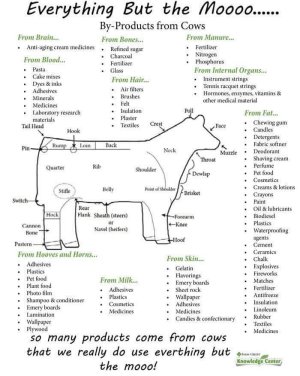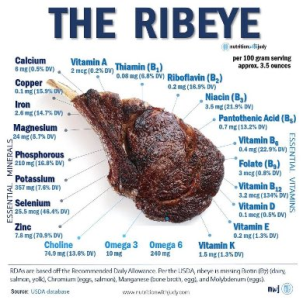Travlr
Well-known member
The world changes and we must adapt. But we don't have to buy into propaganda created to increase the level of general ignorance in the world, especially if it involves some very damaging and dangerous ideas. Ideas that might sound good to the uninformed, but that lack logic and the context necessary to hold up under informed knowledge. In the interest of providing some information relevant to the attacks we are incurring in the Agricultural community from vegan and animal rights sources, I'd like to supply some things I've gathered over the years and welcome you to comment too.
There are several disturbing trends in present times. One is how the farming/ranching community have become a target for urban activists. People with no real experience or education, but with plenty of self righteous indignation, personal virtue, and the numbers to influence legislation. Popular opinion cultivated by an intentional war being waged on Agriculture and those that practice it, especially those that produce livestock.
A list of the claims I've heard made as fact includes:
As far as humans being herbivores, I know of no cultures in the world that are strict plant eaters. There are "Blue Zones" that are often mentioned by vegans, Okinawa, Japan; Sardinia, Italy; Nicoya, Costa Rica; Ikaria, Greece; and Loma Linda California, that are often claimed to be vegan havens. In fact, none of these places where people have managed to live longer than average lives contain strict dietary restrictions or practices. The people being exampled tend to eat less meat, but they also have other habits that are considered beneficial to longer life. You can use the fact checking site, Snopes, to find that any claims of longer life are questionable. https://www.snopes.com/fact-check/do-vegetarians-live-longer-than-meat-eaters/ There are a few places in the world where people do adhere to a more plant based diet, notably northern India, where life spans are lower than average. Again, to be fair, there are other factors than diet at play.
If farmers torture animals to make more money, I'd like to know why livestock performs better across the board if they are healthy and comfortable. Animals gain more weight, give more milk, lay more eggs, and breed easier if they are less stressed, fit, and properly fed. One of the examples I often hear about from vegans is that ducks are force fed to enlarge their livers. The concern is two-fold. One concern is the idea that a duck is forced to consume a large volume of feed quickly, and the other is that the duck must be unhealthy because its liver expands abnormally. In fact, in the wild, ducks normally swallow large fish with sharp fins that are struggling as they are consumed, so ducks are designed by evolution to swallow voluminous quantities. It is also true that in a natural environment, ducks have a seasonal cycle where their livers grow to outsize proportions depending on what kind of natural foods they eat.
See next post...
There are several disturbing trends in present times. One is how the farming/ranching community have become a target for urban activists. People with no real experience or education, but with plenty of self righteous indignation, personal virtue, and the numbers to influence legislation. Popular opinion cultivated by an intentional war being waged on Agriculture and those that practice it, especially those that produce livestock.
A list of the claims I've heard made as fact includes:
- Humans are herbivores.
- Farmers torture animals in order to make greater profits.
- Animals are terrified in slaughterhouses.
- Most agricultural land is used to grow livestock.
- Methane from cows is a major contributor to greenhouse gasses.
- Red meat remains in your gut and rots.
As far as humans being herbivores, I know of no cultures in the world that are strict plant eaters. There are "Blue Zones" that are often mentioned by vegans, Okinawa, Japan; Sardinia, Italy; Nicoya, Costa Rica; Ikaria, Greece; and Loma Linda California, that are often claimed to be vegan havens. In fact, none of these places where people have managed to live longer than average lives contain strict dietary restrictions or practices. The people being exampled tend to eat less meat, but they also have other habits that are considered beneficial to longer life. You can use the fact checking site, Snopes, to find that any claims of longer life are questionable. https://www.snopes.com/fact-check/do-vegetarians-live-longer-than-meat-eaters/ There are a few places in the world where people do adhere to a more plant based diet, notably northern India, where life spans are lower than average. Again, to be fair, there are other factors than diet at play.
If farmers torture animals to make more money, I'd like to know why livestock performs better across the board if they are healthy and comfortable. Animals gain more weight, give more milk, lay more eggs, and breed easier if they are less stressed, fit, and properly fed. One of the examples I often hear about from vegans is that ducks are force fed to enlarge their livers. The concern is two-fold. One concern is the idea that a duck is forced to consume a large volume of feed quickly, and the other is that the duck must be unhealthy because its liver expands abnormally. In fact, in the wild, ducks normally swallow large fish with sharp fins that are struggling as they are consumed, so ducks are designed by evolution to swallow voluminous quantities. It is also true that in a natural environment, ducks have a seasonal cycle where their livers grow to outsize proportions depending on what kind of natural foods they eat.
See next post...



